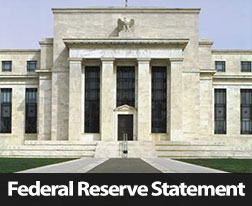Fed Policymakers Make Interesting Decision on Interest Rates
 According to a press release by the Federal Reserve, the Federal Open Market Committee (FOMC), the current target federal funds rate will hold steady at 0.25 to 0.50 percent. Committee members cited positive developments in the U.S economy including jobs growth, stronger labor markets and gradually increasing inflation. In addition, stronger housing sector and household spending were also noted as positive signs for the economy. Committee members cited risks associated with global economic and financial developments as a concern.
According to a press release by the Federal Reserve, the Federal Open Market Committee (FOMC), the current target federal funds rate will hold steady at 0.25 to 0.50 percent. Committee members cited positive developments in the U.S economy including jobs growth, stronger labor markets and gradually increasing inflation. In addition, stronger housing sector and household spending were also noted as positive signs for the economy. Committee members cited risks associated with global economic and financial developments as a concern.
FOMC members are guided in decision making by the Federal Reserve’s dual mandate of maximum employment and price stability. Inflation remains below the committee’s longer-term goal of 2.00 percent; FOMC members attributed slow inflation growth to lower energy prices. The Fed described its current monetary policy stance as “accommodative” and expects it to remain so until inflation reaches 2.00 percent.
Analysts said that the Fed has scaled back its forecast for rate increases from four increases to two increases in 2016, but any actions will depend on FOMC review of current and expected domestic and global factors. Fed Chair Janet Yellen previously cited turbulent market conditions as “significantly” tightening financial conditions due to lower stock prices.
Fed Chair Janet Yellen‘s Press Conference
Fed Chair Janet Yellen explained policy makers’ decision not to raise the target federal funds rate in a press conference after the FOMC statement. Chair Yellen responded to media representatives’ questions about FOMC’s views on inflation and unemployment, zero or negative interest rates and uncertainty about China’s economy
Ms. Yellen cautioned against over-emphasis of the relationship between unemployment and inflation as employment rates only modestly impacts tracking inflation indicators as they relate to wages and prices. In her remarks about the decision not to raise the target federal funds rate, Chair Yellen cited uncertainty about China’s economy as a factor in the decision not to raise the benchmark federal funds rate.
The U.S. economy is strengthening as Europe and Japanese economies wane. Chair Yellen indicated that although global economic decisions influence U.S. monetary policy, that U.S. decisions are not based solely on global economic and financial developments.
In response to a question about whether the FOMC has considered the effects of zero to negative interest rates used by Japan and other nations, Chair Yellen said that committee members were not actively considering or discussing negative interest rates in view of improving economic conditions. Ms. Yellen said that Japan incorporated negative interest rates but did not realize the desired effect of increasing inflation.
Media analysts said that a rate increase in April’s FOMC meeting seems unlikely, but with world-wide economic conditions changing quickly, such, forecasts can’t be cast in cement.

 Week in Review
Week in Review If the time has come to purchase a home and you’ve been perusing the real estate market, it’s possible you’ve also been considering the mortgage options that might work best for you. In the event that you’re already spending a lot of time looking at homes and trying to sell your own, here are a few reasons you may want to leave your mortgage considerations to a professional.
If the time has come to purchase a home and you’ve been perusing the real estate market, it’s possible you’ve also been considering the mortgage options that might work best for you. In the event that you’re already spending a lot of time looking at homes and trying to sell your own, here are a few reasons you may want to leave your mortgage considerations to a professional.